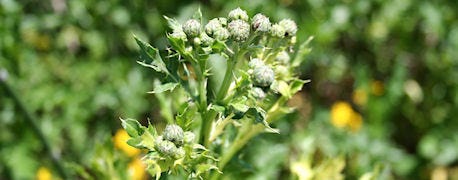
Take the Indiana Prairie Farmer weed identification quiz and see how many of these pesky plant pests you can identify correctly.
Here's your fist hint: A weed may be included more than one because they can look different at different stages. Some of these nasty yield robbers even look different from one another because of genetic variations within the population.
Bill Johnson, Purdue University Extension weed control specialist, noted often during the winter farm meeting season that there are some general tips to achieving better control with tough field weeds. Here are just a few.

Do you have what it takes to be a weed ID master? Take the Indiana Praire Farmer Weed Identification Quiz!
��• Start with a weed-free field. If you plant into weedy fields without all weeds killed, you're asking for trouble from the start.
• Learn the mode of action number for each herbicide. Many herbicides fall into the same mode of action for weed control. Use as many modes of action as you can in one season to help reduce the possibility of weed resistance developing, Johnson says.
• Use residual herbicides with the toughest weeds. Relying on post-only programs is risky today with so many farm weeds developing resistance to major post-emergence herbicide groups.
• Spray weeds at or below labeled height. Carry a tape measure with you. This is important with all weeds, but especially the toughest weeds, like Palmer amaranth (which is tough to tell from waterhemp at times.)
• Spray perennial weeds when they are most vulnerable to full control. This may mean spraying weeds such as Canada thistle in September when regrowth occurs. The plant is more likely to move the herbicide to the roots and kill the entire plant.
Indiana Prairie Farmer thanks Bill Johnson, Purdue University Extension weed specialist and Mark Lawson, Syngenta, for use of photos in our weed identification quiz.
In the coffee shop, it is known as Palmer pigweed. In university circles, it is referred to as Palmer amaranth. Whatever you want to call it, this weed is the No. 1 weed to watch. Stay on top of your control plan with our new free report, Palmer Amaranth: Understanding the Profit Siphon in your Field.
Now it's time for the weed ID quiz. On the next several pages, you'll be presented with 11 pictures of weeds, with a helpful hint and corresponding letter above the photo(s). Use a scrap piece of paper labeled with letters A through K, and identify each correctly. At the end, you'll find out where you rank in the weed identification game!
~~~PAGE_BREAK_HERE~~~
A. Tough customer! This weed goes to seed but also regrows from roots.


~~~PAGE_BREAK_HERE~~~
B. Recognize this weed before it blooms. Control it before it blooms as well.



~~~PAGE_BREAK_HERE~~~
C. This annoying farm weed is heads taller than other weed relatives.

D. This young weed plant is closely related to two other plants in the pigweed family.

~~~PAGE_BREAK_HERE~~~
You're halfway through the quiz!
E. This farm weed is a tough one to control in the spring once it is in the stage shown in the photo.

F. Many of these farm weeds are now resistant to glyphosate. Some burn quickly, then regrow.

~~~PAGE_BREAK_HERE~~~
G. This photo shows the seedling phase of this pigweed-related plant.

H. The petiole on this plant is shorter than the leaf on this young seedling.

~~~PAGE_BREAK_HERE~~~
I. These tall plant pests were sprayed when they were too big.

J. Catch this vining plant pest while it is small.

K. This long, spiny seedhead is a trait of this aggressive plant. It's tough to control beyond 4 inches tall.

Check the next page to see how you did in the Indiana Prairie Farmer Weed ID quiz!
~~~PAGE_BREAK_HERE~~~
Check your answers
A) Canada thistle
B) Canada thistle
C) Palmer amaranth
D) Waterhemp
E) Dandelion
F) Giant ragweed
G) Waterhemp
H) Redroot pigweed seedling
I) Marestail
J) Morningglory
K) Palmer amaranth
How did you do?
10-11: Expert! Bill Johnson may want to hire you!
7-9: You've obviously walked a few farm fields.
4-6: Maybe you should hire a weed scout.
0-3: You might want to think about having your fields custom sprayed!
If you didn't do as well as you'd hoped, perhaps the Farm Progress Weed ID App will help you along. Take it out to your next scouting trip – download for free!
About the Author(s)
You May Also Like




